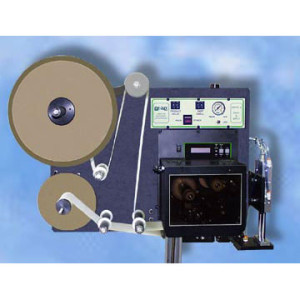By the time you purchase medicine at the pharmacy, it has gone through a rigorous amount of quality control for both the medicine and its packaging. Manufacturers, when using the proper pharmaceutical coding, labeling and packaging technology can track individual lots of medications throughout the supply chain from point of origin to point of sale.
Labeling and coding is critical in the pharmaceutical industry. One of the systems adaptable to pharma packaging is the Re-Pack Series 6 Print & Apply. This versatile printer/applicator integrates with all major brands of thermal transfer printer print engines – Datamax, Sato, Zebra, etc. The applicator is operated by a simple PLC and with a simple software command change the labeler prints either labels on demand so each one can be unique or in batch mode with each one the same. The labeling head may be configured for a wide variety of applications. These configurations include:
- Tamp apply
- Blown-on
- Tamp/blow
- Swing tamp
- Multi panel tamp, and
- Our unique cage style application device allowing long narrow labels to be applied directly to the side of a product.
In addition to the packaging for the pharmaceutical item, manufacturers also need to identify the shipping cases and pallets as a means to track them through the supply and distribution chain. This is necessary, for example, in the event of a recall so the manufacturer can identify which lot number of product went to which area of the country. A Re-Pack Series 6 Print & Apply labeler is a perfect solution.
Pharmaceutical manufacturers are faced with continuous changes in regulations and those lead to unique packaging demands for their products. Having the correct labeling and/ or coding system is critical to meeting these requirements.
What kind of coding technologies should pharmaceutical manufacturers and suppliers look for in a print system? Here are a few to consider:
- Thermal Inkjet printers that are ink-based, non-contact printing on cartons, labels, plastics and synthetic fiber materials.
- Laser printers that offer a permanent marking on, as examples, cartons, labels, bottles, blister foils, ampules and tubes.
- Thermal Transfer Overprinting systems are high resolution, ribbon-based solutions that can print on flexible packaging materials such as labels, pouches, sachets, films along with other materials.
- Continuous Inkjet printers which are fluid based (ink and solvent are mixed in the system) non-contact devices that are ideal for printing on bottles, vials, blister foils, tubes and other flexible packaging in high speed production environments or when printing from below is required.
Staying current on the regulations in the industry is challenging, but having a printing and labeling system in place that helps you adhere to them is key to your operations.
Whether you’re a first year start-up, a larger company that has only a small need for high resolution printing or a company that has a large need for high resolution printing there’s a good chance you’re looking for a low-cost way to code your packages. But, of course, you still want to look professional in...Continue reading→
Foenix Printer Features The market is flooded with various models of ink jet printers across a wide range of technologies, brand names and ink types, which can make it challenging to discern what printer is the best for which application and environment. Many in the industrial and commercial marketplace are loyal to Foenix Coding Printers,...Continue reading→
Studies have shown that 65-70 percent of purchase decisions are made in-store based on the product packaging and labels alone. With the vast quantity of products available, product packaging is incredibly important! Whether you’re redesigning the look of your existing packaging or launching a new product, there are several tips that will help you produce...Continue reading→
Most consumers are aware that there are products generally manufactured by one company but labeled with another company’s brand, aka private labeling. Not only is this beneficial to the manufacturer who profits from the sale of its product but also creates a stream of revenue from the reseller. Meanwhile, the store who is rebranding it...Continue reading→
There are many different styles of hardware supply packaging and labeling. Even with the different packaging types, it’s imperative that all your packaging meet a highly regulated set of stringent packaging regulations. Barcodes, sensor codes, warning labels, all must meet retail and wholesale standards – every single time. For instance: Nails – packaged in tubs,...Continue reading→
Almost everyone uses some type of pharmaceutical product so the packaging of these products is very important. Using pouches or bags with multi-layer barrier films are excellent choices for protecting your product from oxygen, moisture, and sunlight. There are different types of bags and pouches, and printing or labeling them has differing requirements. If you...Continue reading→
Consumers are becoming more savvy with regards to their food choices and many are turning to vegan, or plant-based alternatives. While it may seem these terms are interchangeable, as they both exclude animal products, they are not necessarily viewed the same way, says the Plant Based Foods Association (PBFA). Labels on vegan or plant-based products...Continue reading→
With the advances in technology, most industries have jumped on board to ensure that their labels, packaging, tracking system, marketing, etc., is relying on new and improved ways to keep their operations running smoothly. Using modern technology in the pharmaceutical industry is helping lower the chances of errors in medical offices, hospitals, nursing homes, etc.,...Continue reading→
Each liquid dose label is specifically designed to address individual needs in a pharmacy. From special papers and adhesives to a variety of shapes for irregular or small items, each one is designed to solve an issue for labeling oral medications.Continue reading→
The demand for electronic cigarettes is on the rise and is showing no sign of slowing down. Without a doubt, ‘vaping’, as it’s commonly called, is gaining popularity. According to one survey, 10% of adults in the U.S. now vape, and the CDC indicates that more than 9 million U.S. adults vape on a regular basis.Continue reading→












